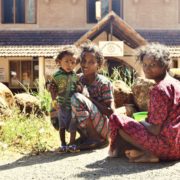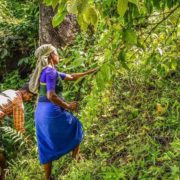Response to the negative impacts of globalization
Our theoretical and conceptual framework grew out of our experience and practice. When India decided in 1991 to move down the path of globalisation, we realised that new economic structures were being created – ones over which we had little control. Decisions made in far away places could have huge negative impacts on the communities we were working with. In spite of decades of work to lift the adivasis of the Gudalur Valley out of poverty they could very easily and quickly slip back unless we found ways of dealing with the globalisation juggernaut.
Sadly by the end second half of the nineties, our worst fears became a reality as tea prices crashed and our community of adivasi tea farmers was plunged back into poverty.
Just Change was our response to these negative impacts of globalisation. We decided to develop new and alternative trade structures, ones that would link the local to the global. Structures and ways of working that were based and driven by human values and not blind profit. If we must have a global village, let it be one of our own making!
This was the thinking that led to us developing the theoretical framework of Just Change.


